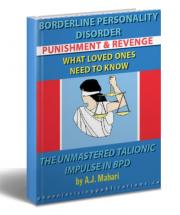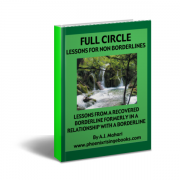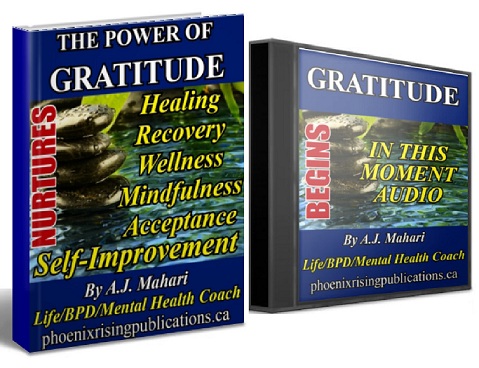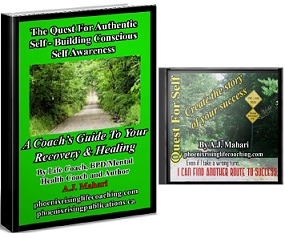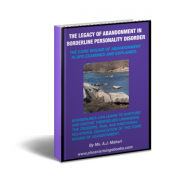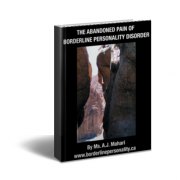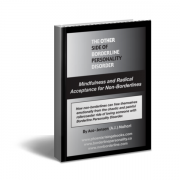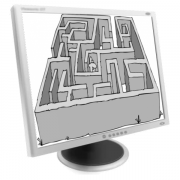Open Letter To All With BPD
A.J. Mahari, a Canadian woman and Life Coach now 52 years old, who recovered from Borderline Personality Disorder 14 years ago writes an open letter to all who have been, as she was at the age of 19, diagnosed with BPD.
If you are family member, loved one, ex or relationship partner (non borderline) of someone with BPD reading this Open Letter to those with BPD and you'd like more information about BPD, along with the resources linked to in this letter to and for those with BPD, I have Ebooks and Audio Programs specifically for you along with my life coaching services
If you have been diagnosed as having Borderline Personality Disorder (BPD) there are few things you need to remember.
Firstly, the traits and or characteristics that you have that have caused a mental health professional to diagnose you with BPD are also traits or characteristics found in the general population. Therefore you are not 'weird' or a 'freak' or 'hopeless' or any of those negative labels. What having BPD means is that you are not coping as well with life as perhaps it would serve you to.
As a person who had BPD and recovered from it, I maintain that BPD is primarily a relational disorder. What you need to do is learn how to relate to yourself - to find your true self and give it more credence than your false self.
Borderlines are not crazy. They react and often act very intensely to things for many different reasons. This does not mean that you are unlovable. But it is the degree to which you can learn to relate in the middle, or grey of life, between the black and the white and the degree to which you can be responsible for yourself and learn to relate to others consistently that will decide whether or not you have healthy and functioning relationships.
Secondly, BPD is quite a catch-all label, sadly, with quite a negative stigma attached to it. Do not be ashamed to be who you are or to have BPD. Remember having BPD is one thing and being borderline is another. BPD does not have to become the defining foundation of who you are, unless you let it.

Those who are diagnosed with BPD are usually in a lot of pain. Often this pain is denied and buried deep inside. It may come out through impulsive sex, stealing, over-eating, "acting out", rages, uncontrolled outbursts of anger, demanding, co-dependent helplessness that alternates with dominating and demanding intimidation of others, all in an effort to try and feel safe and to protect yourself. If you a quiet acting-in borderline your psychological/ emotional woundedness and pain has the same base and origin as those who present the more "typical" manifestations of BPD. Along with all the continuing speculation about the cause or causes of BPD it was my experience that what I have termed the core wound of abandonment is at the centre of everything borderline. This core wound of abandonment - one's original abandonment trauma lays the framework for the foundation of what becomes BPD. The reality then is that unless and until someone with BPD gets effective and life-changing treatment the reality is that there is a very profound and on-going impact of the core wound of abandonment that continues to support the very painful, self-defeating, and often self-destructive patterns in the lives of those with BPD.
Both the quiet acting-in borderline and the (more well described/known or more typical) raging acting-out borderline share a common fragmented intrapsychic infrastructure that has at its base abandonment and a the most human reaction to the shame of abandonment that there is - rage. The major difference between the quiet borderline and the raging borderline is the way in which everything borderline is manifested. The differences do not lie in the actual reality of all that it means to have BPD. Quiet borderlines will benefit much more than they might imagine from understanding the many sources, manifestation, and reasons for borderline rage and the reality that borderline rage is as relevant to the quiet borderline as it is to the raging acting out borderline. In fact it can be much more difficult for those who are quiet borderlines to actually get the help they need and to get on the road to recovery, for many reasons, but, in large part due to the very nature of their dissociation from their own rage.
Experts still argue about how much of BPD is biological versus environmental etc, the truth is you still have to get on with your life now. Sometimes meds can help. But no amount of or combination of meds is going to eliminate the need for you to work hard on yourself in therapy.
Thirdly, while those with BPD continue to get a bad reputation with professionals and people in their lives the fact is that not all borderlines are the same. Yes, many characteristics and issues can be the same but each person brings to those and to BPD their own unique individuality. You can choose who you want to be and fit that with your authentic self and learn to be consistent.
Having Borderline Personality Disorder is one of life's most profound challenges. It does not have to be a life sentence. I have recovered from it. Others have recovered and/or are recovering from it. So too, can you.
Recovering from BPD is process. "Being borderline" isn't a crime. It is time that more people pay attention more to the agonizing pain underneath the actions of those with BPD and pay a little less attention to the way in which any given person with BPD chooses to try to survive and thus illustrates the traits of BPD.
Be clear on one thing, if you continue to treat people poorly, manipulate them or abuse them they will leave you. This is the primary way that borderlines continue to play out their own abandonment wounds through others.

You need to define yourself from the inside out and stop attempting to define yourself through others. Others can't be you anymore than you can be them. Learn to be the YOU that you have always been meant to be. You are a world waiting to be born.
Recovery from BPD requires hope. I talk a lot about this in my Audio Program, Finding Hope From the Polarized Reality of BPD At the centre of the recovery process is the journey From False Self To Authentic Self and this journey of recovery is one that can be further enhanced by preparing for recovery from BPD.
Working toward recovery requires that each person with BPD learns how to take personal responsibility for himself or herself. You must learn to take care of yourself, learn to be alone and no that you can validate yourself.
Healing really is a choice. You must make that choice. If you don't make a choice to get well you won't get well.
Know that you are not alone. You are not alone. Many people know your pain from the inside and the others side. People do care. Be careful not to ask too much from anyone and remember even when you feel very young the world expects you to move toward "acting your age". Stop believing that you have to be what you feel. You can find and then be fully you no matter what you feel. You can learn to be age-appropriate even while experiences very young hurt once you validate yourself and you pain. Stop abandoning your inner-child. He/she needs you more than you think you need anyone else.
Much about being borderline has to do with various levels or amounts of dissociation. You must integrate your reality and validate it yourself in order to grow comfortable with it and in order to be able to trust it and feel safe with it.
In my own experience, when I was borderline, there was so much about me that was fake. What was really fake, for most of the years that I had BPD was the fact that I was living in and from a false self Then, as I healed and unwound the ways in which my false self manifested itself into the world though my relationships; what was real -- my authentic self, at times would still feel unreal or fake though it was changing and what then felt fake was real, it was just new. In recovery there is a sense that the more real you are the fake it feels as if you are. Do not let this dilemma keep you stuck. Do not allow the borderline magical thinking of letting what you feel define what your reality is. That is a trap of the borderline false self The saying, "fake it Ďtil you make" applies here. Borderlines in recovery need to walk the walk of becoming and being emotionally competent before they can ever believe in themselves as being competent. There is nothing dishonest about that. Doing is seeing and seeing is believing. It is also only through new choices acted upon that you will begin to see the kind of differences that can re-build your trust and belief in your authentic self - the self that was lost that you need to find, reclaim and re-parent.
Change, healing, and recovery are possible. Borderline Personality Disorder does not have to be a life-long way of living what is a very painful and self-defeating life that reflects an inability to sustain relationships.
I want to say to you that you can make it, because you really can. You must choose to live long enough to make it. Things can and will change. Living on the other side of BPD -- in the "average" and so called "sane" world does not mean that life doesn't present challenges, pain and disappointment. The difference between "being borderline" and NOT has all to so with choices and cognitions. Those with BPD need to learn how to undo the illogical thoughts and the magical thoughts that get so easily confused with "reality".
Be true to yourself and to your process. Believe in yourself, your ability and your worth. Search for and begin to trust in hope. Refuse to accept the stigma of BPD. Refuse to let the stigma of BPD limit you or your potential to get well. It does not belong to you. It belongs to those who ascribe to it for their own reasons. Nevermind trying to change the mind's of those who ascribe to the many aspects of profound stigma against BPD and those who have BPD. Instead work to change your own mind about what BPD means in your life.
Having Borderline Personality Disorder does not make you LESS of anything. You are still human. You feel. You need. You ache. You want. Perhaps even more than the average, you feel, need, ache and want -- but that's okay. Those with BPD are also usually keenly aware of others' feelings and very compassionate (whether they can express that or not) and those with BPD are also usually very intelligent. Let your smarts work for you.
If you get nothing else from this letter from me, a recovered borderline, to you, a borderline, please know that you are not a MONSTER! You are NOT a BAD person. You do not deserve the stigma of unskilled professionals. You do not deserve to be categorized as "less than" or "incapable". You have a life script, like anyone else and you really can change it mid-stream. You really can heal. You really can feel all of your pain, grieve your losses and heal your original abandonment wound without it killing you. YOU, my BPD, friend, ARE A SURVIVOR! Don't let anyone else tell you anything else.
You deserve to live -- out live your pain and your angst to find peace, yes peace, you can and you will find peace! You deserve to be heard, validated and believed when you tell and live your truth. Be kind and gentle to yourself. You do not have to keep hurting yourself to be heard, believed or for others to know that you are indeed in pain. Learn to validate your own pain and let that be far more important than what others think or believe.
When the night creeps in so hollow and you feel like you are at the end of your rope know that you can fill what is hollow or empty in your night and yourself. When you get to the end of rope, take a deep breath, tie a knot at the end of the rope, and hold on just a little bit longer. Pain comes to pass. Panic comes to pass. All things come to pass. You are precious and you need to give your gifts firstly to yourself and secondly to the world.
If you continue to make the same choices you will continue to get the same results. Learn that a healthy amount of risk is needed to make the new choices that will give you the new and different results you need to break through the patterns that may be keeping you stuck.
You may think you desperately need someone else or other people to define you and to help you feel real and to help you feel that you really do exist. I know it can feel that way in the active throes of BPD. However, you can learn how to validate yourself and get to really know your self in ways that will free you from trying to live through others.
If you don't know who you are -- yet and you don't feel able to love and or accept yourself just yet know that I offer you both, love and acceptance, and that it is in my writing and my work to educate all with BPD and others about BPD that I reach out to you here and now and say to you -- don't succumb to this and know that whatever maladaptive coping mechanisms you employ (defense mechanisms that you currently need) like self-harm, over-eating, impulsive sex, stealing, addictions, and so forth are the best that you can do right now. When you know better, you will do better and until then know that I am one person in this world who really does care and really does understand -- YOU ARE NOT ALONE!
If you don't have a competent therapist -- find one. Don't settle for anything less. If you are or feel suicidal call your therapist or local hospital for help. I know all-too-well how futile reaching out for help can FEEL. Things often aren't truly as they FEEL. Don't let your feelings stop you from what your head tells you that you need. The truth is it is YOUR RIGHT to be helped and one time when you reach out, no one knows which time it will be, you will find that hand that you've so longed to wrap yours into and hold on to as it holds yours -- it will appear -- and the beginning of your bridge back will have formed. Treasure that connection when it is offered to you. It can mean the difference between life and death.
I kept reaching out until the first time, of many to come, that my reaching out met with that special someone (therapist initially) that I had to meet, from where I stood, and what I understood, (and mainly all that I didnít know and understand and needed to learn and find out about) in the middle of impossibility. Embrace this for yourself now (if you havenít already) in order to begin your journey toward your authentic self and mental health.
I believe you and I believe in you. Aim to walk across the bridge from Borderline Personality Disorder to mental health. I did, you can -- BELIEVE IT!
© Ms. A.J. Mahari August 19, 2000 with additions November 16, 2008
A.J. Mahari is a Life Coach who, among other
things, specializes in working with those with BPD and non borderlines. A.J. has 15 years experience as a
BPD/Life/Mental Health Coach
and has worked with hundreds of clients from all over the world.
A.J. Mahari is currently writing a memoir about her life and experience as a person who had two parents with Borderline Personality Disorder, as a person who was diagnosed herself with BPD at the age of 19 and from her perspective as someone who has recovered from BPD. There is a new section on her BPD Blog called The Diary - My Borderline Years where A.J. Mahari shares snipets of experience from her own life that is will give you just a taste of what her memoir will include.
Audio Program "Preparing For Recovery From BPD" Parts 1 & 2 by A.J. Mahari
Audio Program Rage Addiction in BPD by A.J. Mahari (sold separately or packaged with Mahari's Ebook, "Rage and BPD")
- Purchase all 3 of ebooks for NON BORDERLINES
- Non Borderlines - You can purchase 6 ebooks packaged together with or without audio.
- Those with BPD and/or Non Borderlines can purchase A.J. Mahari's 3 "Core Wound of Abandonment" series ebooks packaged together with or without audio.

No reproduction in whole or in part without the written consent of A.J. Mahari. To seek permission to re-produce anything on this site or to link anything on this site please email me at bpdinsideout(at>yahoo.ca - I do not give my consent for anything I've written to be re-produced on any other website without my expressed permission. If you wish to link to an article I've written please link directly to the article page on this site - thanks so much!






